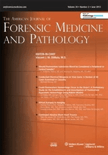
AMERICAN JOURNAL OF FORENSIC MEDICINE AND PATHOLOGY
Scope & Guideline
Pioneering Research in Pathology and Forensics
Introduction
Aims and Scopes
- Forensic Pathology:
The journal emphasizes research related to forensic pathology, encompassing autopsy techniques, cause of death determinations, and the application of pathology in legal contexts. - Toxicology and Substance Abuse:
There is a notable focus on toxicological studies, particularly regarding fatalities related to drug overdoses, poisons, and the implications of substance abuse in forensic cases. - Death Investigations and Legal Implications:
The journal covers various aspects of death investigations, including methodologies, legal implications, and the role of forensic professionals in death certification. - Case Studies and Clinical Applications:
Through detailed case studies, the journal provides insights into unique or complex forensic cases, enhancing the medical community's understanding of various death scenarios. - Emerging Trends in Forensic Science:
The journal addresses emerging trends in forensic science, including the adoption of new technologies and methodologies that enhance investigative processes.
Trending and Emerging
- Impact of COVID-19 on Forensic Investigations:
Recent publications highlight the ongoing effects of the COVID-19 pandemic on forensic investigations, particularly in suicide trends and pandemic-related fatalities. - Advances in Forensic Imaging Techniques:
There is a growing emphasis on the use of advanced imaging techniques in forensic pathology, such as postmortem CT and MRI, as essential tools in death investigations. - Mental Health and Forensic Pathology:
The journal increasingly explores the intersection of mental health issues and forensic pathology, particularly in the context of suicides and violence. - Synthetic Drug Toxicology:
Emerging concerns regarding synthetic drugs and their toxicological implications are increasingly prominent, reflecting current trends in drug-related fatalities. - Gender and Identity in Forensic Investigations:
The journal has begun to explore themes related to gender identity and its implications for forensic investigations, indicating a shift towards more inclusive approaches in the field.
Declining or Waning
- Historical Forensic Practices:
There has been a noticeable decline in papers discussing historical forensic practices, suggesting a shift towards contemporary issues and technologies. - Generalized Case Reports:
The trend indicates a waning interest in generalized case reports without novel findings or implications, as the journal increasingly favors studies with specific, impactful insights. - Non-Pathological Deaths:
Research related to non-pathological deaths seems to be decreasing, reflecting a broader focus on forensic pathology's direct implications in criminal justice and public health.
Similar Journals

Forensic Toxicology
Pioneering Research in Forensic ToxicologyForensic Toxicology is a premier journal published by Springer, renowned for delivering cutting-edge research in the realms of toxicology, biochemistry, and forensic medicine. With an ISSN of 1860-8965 and an E-ISSN of 1860-8973, this journal has established itself as a significant resource for professionals, researchers, and students engaged in the analysis of toxic substances within a forensic context. Its impressive impact factor and ranking reveal its influential presence in the field, particularly as it is categorized in Q1 for Pathology and Forensic Medicine and Q2 for Biochemistry (Medical) and Toxicology. Featured articles span a wide array of topics, facilitating interdisciplinary collaboration and advancing scientific knowledge. While currently not an open-access journal, it remains accessible through institutional subscriptions. With a convergence span from 2006 to 2024, Forensic Toxicology is committed to publishing high-quality research that enhances the understanding of toxicological phenomena and their implications in forensic investigations, reinforcing its role as an indispensable resource in the scientific community.

INTERNATIONAL JOURNAL OF LEGAL MEDICINE
Uncovering Truths at the Crossroads of Law and MedicineINTERNATIONAL JOURNAL OF LEGAL MEDICINE, published by SPRINGER, stands at the forefront of research in the fields of legal medicine, pathology, and forensic science. With an ISSN of 0937-9827 and an E-ISSN of 1437-1596, this esteemed journal has successfully maintained its reputation as a leading publication since its inception in 1990, providing a platform for the dissemination of cutting-edge research and case studies. The journal is recognized as a Q1 category publication in the 2023 Pathology and Forensic Medicine quartiles, ranking #44 out of 208 in its category on Scopus, reflecting its significant contribution to the academic community—demonstrated by its impressive 79th percentile. While the journal operates under a traditional subscription model, it is committed to enhancing access to critical insights in legal medicine. The INTERNATIONAL JOURNAL OF LEGAL MEDICINE invites researchers, professionals, and students to explore its manuscripts that shed light on the intersection of law and medicine, thus pushing the boundaries of what is known in these vital fields.
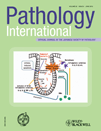
PATHOLOGY INTERNATIONAL
Innovating Insights for a Healthier TomorrowPATHOLOGY INTERNATIONAL, published by WILEY, stands as a distinguished journal in the field of pathology and forensic medicine, serving as an essential resource for researchers, clinicians, and students alike. With its ISSN 1320-5463 and E-ISSN 1440-1827, PATHOLOGY INTERNATIONAL has established itself since its inception in 1951, navigating through an evolving landscape in medical science with insights and breakthroughs up to 2024. It holds a commendable Q2 ranking in both the Medicine (miscellaneous) and Pathology and Forensic Medicine categories, indicating its robust influence and quality within these fields, as evidenced by its placement in the 70th percentile of Scopus rankings. While currently not an open-access journal, it provides access options that ensure valuable research remains available to the academic community. PATHOLOGY INTERNATIONAL commits to advancing the discipline through pioneering research articles, comprehensive reviews, and expert opinions that push the boundaries of understanding in pathology, thereby supporting the enhancement of diagnostic and therapeutic practices.
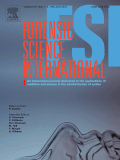
Forensic Science International
Elevating Forensic Science to New HeightsForensic Science International is a premier journal published by Elsevier Ireland Ltd, dedicated to advancing the field of forensic science through interdisciplinary research and scholarship. Since its inception in 1978, this esteemed journal has provided a platform for vital research, receiving recognition in the Q1 category for both Law and Pathology and Forensic Medicine as of 2023, underscoring its significant impact in these domains. It currently ranks 54th out of 1025 journals in Social Sciences - Law and 51st out of 208 in Medicine - Pathology and Forensic Medicine, placing it in the top echelons of academic journals according to Scopus metrics. Forensic Science International transitioned to Open Access in 2019, ensuring that critical findings are widely available to the global research community and enhancing collaboration among forensic professionals. With a forward-looking scope that evolves to meet the challenges and innovations of forensic science, this journal remains a pivotal resource for researchers, practitioners, and students who are committed to the continued advancement of forensic science and its applications in legal contexts.
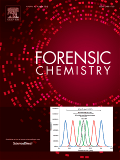
Forensic Chemistry
Championing excellence in forensic science and practice.Forensic Chemistry is a premier journal published by Elsevier, specializing in the interdisciplinary field of forensic science, with a strong emphasis on analytical and materials chemistry, pathology, and law. Established in 2016 and converging to a significant publication trajectory through 2024, the journal has rapidly ascended to an impressive Q1 ranking across multiple categories, demonstrating its impact and commitment to advancing forensic analysis and methodologies. With an impact factor reflecting its relevance—especially notable with a 95th percentile rank in Social Sciences and Law—Forensic Chemistry serves as an essential resource for researchers, legal authorities, and academics seeking to explore the latest developments in forensic techniques and applications. Its rigorous peer-review process and high-quality publications ensure that it remains at the forefront of scientific inquiry in forensic practices. Access to the journal is available without an open access model, further emphasizing its commitment to curated, high-impact scholarship that contributes to both theoretical foundations and practical applications in the forensic field.
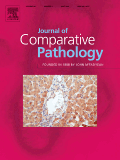
JOURNAL OF COMPARATIVE PATHOLOGY
Illuminating the Complexities of Disease Across SpeciesJOURNAL OF COMPARATIVE PATHOLOGY, published by Elsevier Science Ltd, stands as a significant publication within the fields of pathology and forensic medicine, as well as veterinary studies. With an ISSN of 0021-9975 and an E-ISSN of 1532-3129, this journal has been disseminating critical research since 1950, contributing to the advancement of knowledge through its focus on comparative pathology. The journal's reputable standing is underscored by its Q3 classification in Pathology and Forensic Medicine and Q2 in Veterinary (miscellaneous) for 2023, reflecting its vital role in shaping contemporary discourse in these domains. The Scopus ranks further solidify its presence, placing it at the 51st percentile in general veterinary sciences and the 32nd percentile in pathology—a testament to the quality and relevance of the contributions it publishes. Although it operates under a subscription model, the journal remains accessible to researchers and practitioners who aim to deepen their understanding of pathological phenomena across species, enhance diagnostic accuracy, and improve clinical practices. With a steadfast commitment to rigorous peer review and a global readership, the JOURNAL OF COMPARATIVE PATHOLOGY is an essential resource for those engaged in research and professional practice, fostering collaborations and innovations that bridge complementary areas of study.
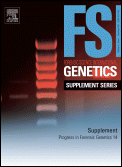
Forensic Science International Genetics Supplement Series
Shaping the future of forensic science through genetics.Forensic Science International Genetics Supplement Series, published by Elsevier Ireland Ltd, is an essential resource for professionals, researchers, and students engaged in the increasingly critical intersection of genetics and forensic science. This peer-reviewed journal, with an ISSN of 1875-1768 and E-ISSN of 1875-175X, provides a platform for disseminating innovative research findings and methodologies that enhance the application of genetic techniques in forensic investigations. The journal has gained recognition within the academic community, evidenced by its notable rankings in Pathology and Forensic Medicine as well as Genetics, placing it in Q3 and Q4 quartiles respectively in 2023. Although it operates without an open access model, its targeted converged years—spanning from 2008 to 2022—exemplify a commitment to fostering ongoing advancements in forensic genetics. Despite its positioning, the journal remains a significant contributor to public discourse, with an emphasis on the role of genetics in legal contexts and the continual evolution of forensic methodologies.

Scandinavian Journal of Forensic Science
Transforming forensic insights into societal impact.The Scandinavian Journal of Forensic Science is a premier open-access journal published by SCIENDO since 2012, dedicated to advancing the field of forensic science. With its ISSN 2353-0707, this journal provides a platform for researchers, professionals, and students to disseminate their findings on various aspects of forensic investigations, including but not limited to forensic biology, chemistry, toxicology, and crime scene analysis. The journal plays a vital role in promoting collaboration and knowledge exchange among forensic practitioners and academics, ensuring that cutting-edge research is accessible to all. As a part of the reputable SCIENDO publishing group, the Scandinavian Journal of Forensic Science upholds high standards of peer review and editorial rigor, making it an essential resource for those involved in the forensic science community. Readers can benefit from its open-access model, which fosters wide dissemination and enhances the visibility of published works, ultimately contributing to the societal impact of forensic research.

Anil Aggrawals Internet Journal of Forensic Medicine and Toxicology
Championing Diverse Voices in Forensic ResearchAnil Aggrawals Internet Journal of Forensic Medicine and Toxicology, an esteemed publication in the field of forensic medicine and toxicology, is dedicated to disseminating innovative research and critical insights since 2000. Published by ANIL AGGRAWALS INTERNET JOURNAL FORENSIC MEDICINE & TOXICOLOGY, the journal caters to professionals, researchers, and students keen on advancing their understanding of forensic science, including its intersections with law and public health. Although it currently holds a Q4 quartile ranking in Law, Pathology and Forensic Medicine, and Toxicology, the journal provides a vital platform for underrepresented studies, encouraging a diverse range of scholarly contributions. With its open access model, the journal enhances visibility and accessibility, ensuring that valuable research can reach a wider audience. As the journal continues to evolve, it plays a crucial role in bridging theoretical knowledge and practical applications, thereby enriching the discourse within its fields of study and fostering inter-disciplinary collaborations.
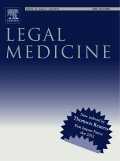
Legal Medicine
Fostering knowledge at the crossroads of ethics and practice.Legal Medicine, ISSN 1344-6223, published by ELSEVIER IRELAND LTD, stands as a pivotal academic journal within the realms of forensic medicine and legal ethics. Operating from the Netherlands, this journal has established a strong reputation among researchers and practitioners since its inception in 1999, with the goal of advancing knowledge in the intersection of legal and medical disciplines. With a commendable Q2 categorization in both Issues, Ethics and Legal Aspects and Pathology and Forensic Medicine, it ranks among the noteworthy publications in these fields, placing it in the 51st percentile for Pathology and Forensic Medicine and 51st for Nursing-related ethical issues. The journal not only serves as a repository for innovative research and practical case studies but also emphasizes the importance of ethical considerations in medical legal scenarios. Although it does not offer Open Access options, it remains a crucial resource for professionals, researchers, and students seeking to stay informed about the latest developments that shape legal medicine. Access to its contents promises to enhance understanding and inspire advancements in both forensic science and the ethical frameworks surrounding them.